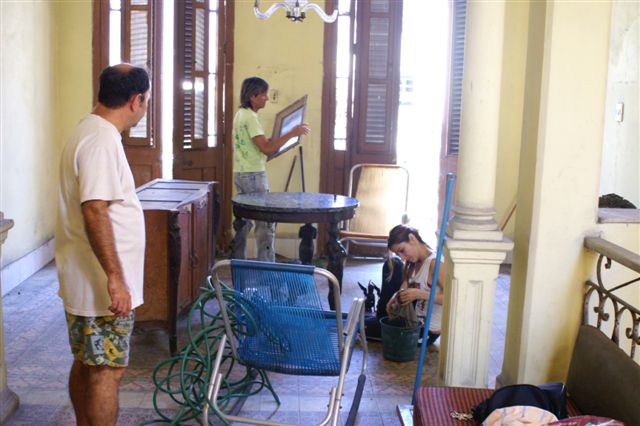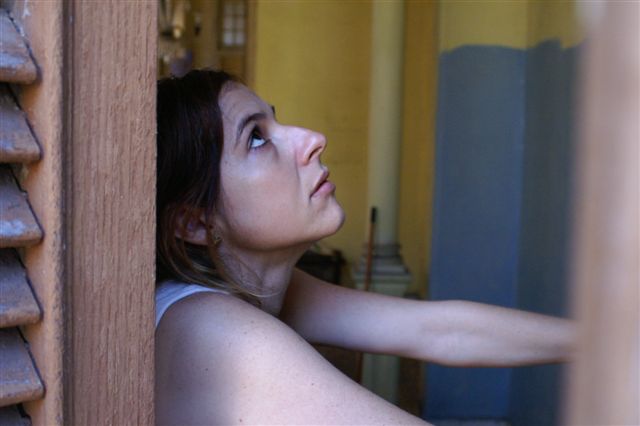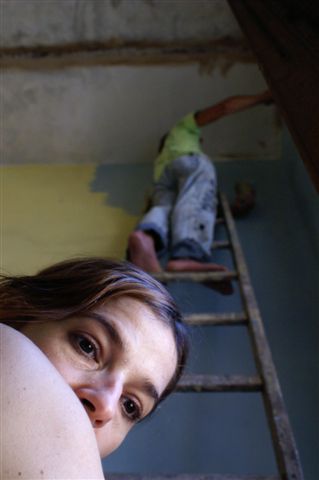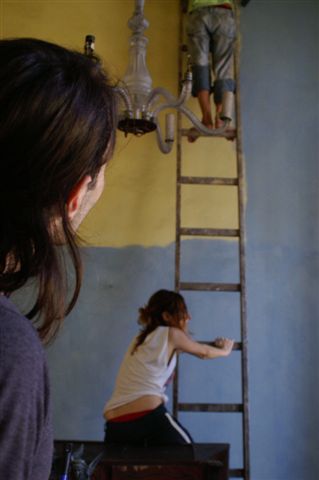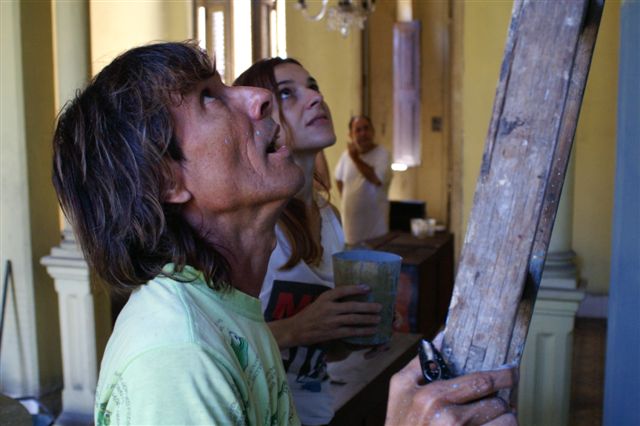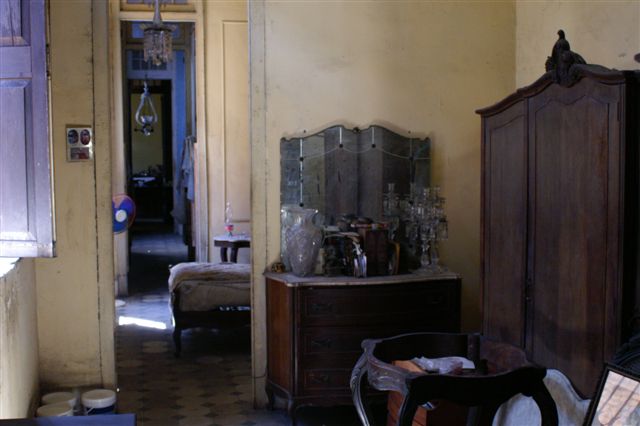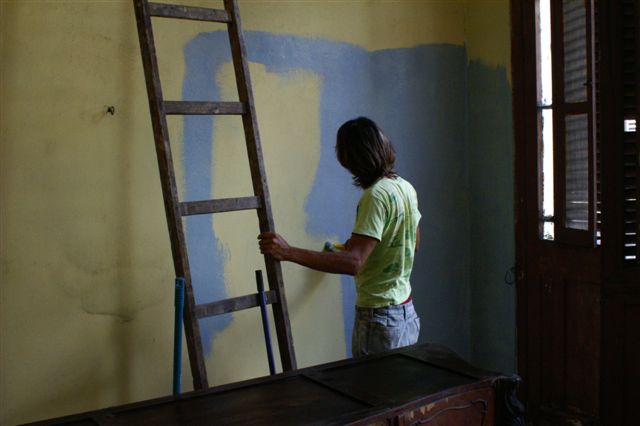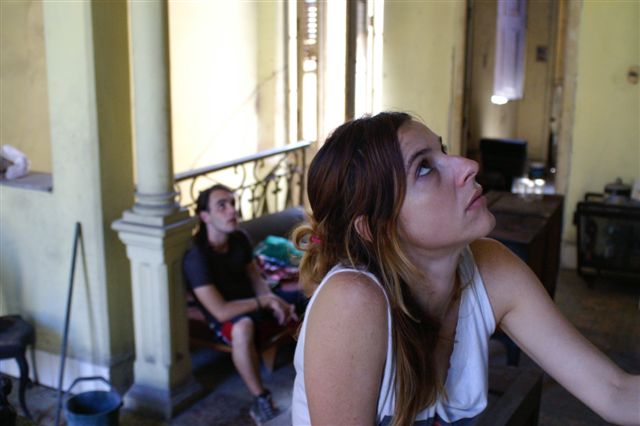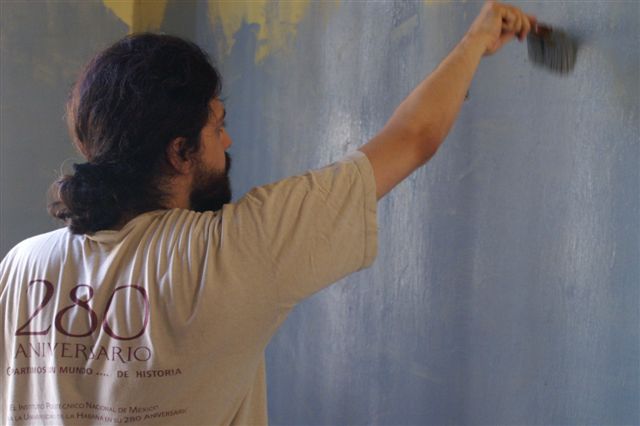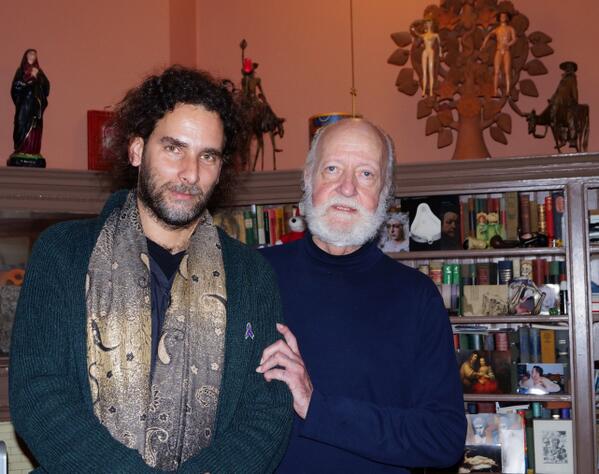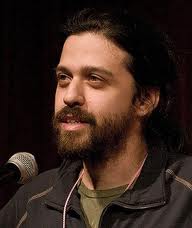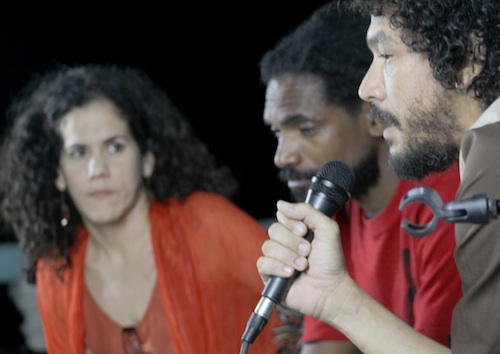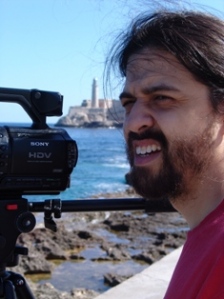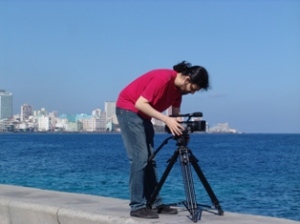I believe that the utopia of truly independent dramatic feature length cinema, doesn’t exist. You are always still dependent on actors, or favors at the very least. It is true that independent production has increased tremendously. But there is a catch. These are in many cases films independent from a economic perspective, but not always in terms of form and content. For many filmmakers Independent Cinema is merely a vehicle to spark interest from an industry they are desperate to be a part of.
For me, cinema is salvation. The only thing in this world I can have complete control over. It is also a relief that my talent lies in the arts and not in politics, otherwise I would probably be a dictator.
Originality is difficult nowadays, but neither is it necessary. What’s important is to absorb so many influences in order for originality to be born, out of extreme hybridism. However fads are still an enemy to be reckoned with. Nowadays some festival programmers of “serious” art house Latin American Cinema seem greatly fascinated by minimalism, (often imported from Asian Cinema) long shots, absence of incidental music and stylization in the image, and contemplative tempo that doesn’t judge the characters. All this is hardly new, almost half a century ago some European films were doing it as well. I believe in being a sponge, but a sponge sucks in everything and mixes it. When I begin to see “Avant Garde” films that look, feel, and breathe alike, over and over, fashionably programmed in festivals that are supposed to showcase the different and unique, it becomes troublesome to say the least. The hegemony of a risk-lacking elitist fad is more dangerous than pop culture in its obscenity. You know what to expect from pop culture — after all there is enough flow of material there to absorb, distort, and recompose — but an elitist fad is a world closed in itself. What is Modern Art then, if the cinemas, galleries and museums that are meant to showcase it (and once upon a time did) are no longer interested in taking risks?
Melodrama for example has been vilified as something akin to television, Hollywood or simply no longer fashionable. Many art filmmakers today discard strong emotions, and sterilize their on-screen feelings, like adolescents fearing to lose the coolness. Political correctness as well, has weathered a great deal of contemporary independent cinema. I’m referring to “Film Festival movies”, many times designed in a calculating way to please the programmers who please sponsors, who often please audiences who want their sense of cool intelligence pleased (but not challenged too much). It is a disturbing sight when directors buy into this game and discuss its terms. Because only one thing counts. If the work is sincere it will always find an audience, whether is small or large it doesn’t matter. Even if its small, you are providing those people with a work that nobody but you would share with them. Independent Filmmakers could be categorized in the following:
1. Filmmakers who make films for a career in the industry and its subsequent notion of success measured in the box office.
2. Filmmakers who make films or a career in Film Festivals and its subsequent notion of success based on awards and reviews.
3. Filmmakers who make films it because they have no choice but to vomit them straight from the subconscious, so that it can be completely exorcized, and then they can sleep at ease with themselves, if only to awake again in a world of eternal torment, which they both hate and love, for it fuels the next film. The smallest group by far.
Some filmmakers manage to be in two of the three categories. I’m not saying festivals or box office are evil, but if it is the main goal we cannot talk in either case about independent film, for its very spirit is dependent.
Many low budget filmmakers appreciate digital format as a cheap alternative to 35mm. Few worship the intrinsic characteristics that make digital different than film. The gigantic depth of field is to me an incredible achievement of technology. The full impact of a face full of pores and wrinkles in the crispness of High Definition glory, while the background is in equally sharp focus, a baroque shot where all its elements are visible, making the audience read as many visual layers which translates into more interpretations that each image can have. Greg Toland was killing himself to achieve this in Citizen Kane. Now 70 years later, digital technology allows it, so people are killing themselves to defocus the background, desaturate the colors, remove the “odious HD sharpness” from the image. And why? What’s the conceptual justification for this? The answer is appalling and I have heard it several times: “It looks more like film” The absurd conversation often continues like this: “I know it looks like film”
This operates the same as racial discrimination. True that most television is dull, a dialogue driven medium that even when it occasionally strives for visual flair, it is usually for copying a movie that has proven itself in the box office. No chances are taken in the way of true experimentation here. But television itself as technology is not evil. What is truly cinematic is how you move the camera, how you choreograph staging, how you frame and where you cut. Using the technology to tell the story. I once saw a horror film shot with the Digital Canon 5D, there was a shot of a girl walking in an empty hallway, the camera was behind there, she was walking into the dimly lit hallway which was completely out of focus. It really worked, not because “it looked like film”, but because not being able to see the background, added tremendous tension. On another note, you are filming a drama having a carefully composed shot with all the elements of the art direction adding information about the character and setting that enriches the meaning of your shot. Why in the world would you want to have it out of focus? Because “It looks more like film”?
Another example, a man is writing a novel on his computer. The foreground has a television with a political leader out of focus. What does it mean? I means two things:
1- The man is so absorbed in the world of his novel that he hardly cares about politics in the real world, hence reality is literally blurry.
2- The images of the television were actually downloaded from youtube, so given that the image was extremely pixilated, having it out of focus was the only way to deal with it. And so the defect becomes an effect. #2 becomes #1. The problem gets a conceptualized solution.
Another misinterpretation, specially early on, was that Digital Video was meant to adhere to a dirty aesthetic, hand held, even auto iris and auto focus. Enough Dogmas.
Nothing is sadder than New Filmmakers making Old Films. Nothing is more irritating that sensing the “Cannes type” or “Sundance genre” in a film. Godard said something that comes to mind now. Culture is the norm, art is the exception. Much more than before that many festivals program films that are more intelligent than the Hollywood norm, true, but hardly without crossing the threshold of truly uncomfortable cinema. A festival’s programming responsibilities today (with a few exceptions) seem to lay more towards assuring a compromise of commercial interest (a big healthy dose of crowd-pleasers with token movie stars), political correctness (to make sure that no specific group or sponsor gets offended). Oh! And last and surely least: A healthy minimal dose of “difficult films” made with “artistic integrity” (To put it simply: unwatchable things.) We’ll place them in a ghetto section called “Avant Garde” or “New Languages and New Aesthetics” in case you want a little punishment. After all it is art, isn’t?
I think the filmmakers are to blame as well. While it is possible to often find audacity in the content, the form is less daring. Frankly uncomfortable subject matters are in some way softened by a serviceable, lazy mise en scene, which operates in auto pilot. As if filmic memory would only operate within the accepted mainstream constraints of the last decade. Hard to find styles that reflect the evolution of film history. The independence of a visual grammar is constantly narrowed by “what works” The core problem still a fear of the images as a narrative drive. Many people are just not trained to have a complex dialogue with images, and resort to the laziest, which is to have the characters tell you the story through dialogue. Like I said, it’s a matter of training, because nothing is more universal than images, and the language that is born of their juxtaposition. But it’s more work for the brain and people fear that. Not everybody, not every filmmaker. But exceptions suffer also from the programmers’ lack or risk taking maneuvers. A different cinema cannot exist if the promoters don’t take the same chances as the filmmakers. There was a time when film critics were more relevant, today reviewers have the upper hand. It’s hard to change that, but one can’t give up. To quote an old Spanish saying: “The letters and words will be carved into the brain through sweat and blood if necessary.”
Will things change? Probably not. Why complain then? Every generation has more or less the same conflicts, which end up repeating themselves in one way or another. It might be that my apocalyptic vision of the world is no more than a creative-defense mechanism for me. I might end up using this text, which was meant to start as an analysis of Independent Cinema, to feed the nightmarish atmosphere I have always needed for inspiration. It might be masochism, but I find beauty in alienation. Could I then say that my movies are escapist fantasies? Maybe. Therapeutic even.
I’m 34 years old and I already sound like a cantankerous old man ranting about the same thing over and over. But I need obstacles, obstacles keep you young even if you are an old soul. The truth is I always loved old movies, and however certain new things bring me the same enthusiasm and ingenuity of a child. I start mixing and putting things together. Its essential in the creative process, the mystery of situations a child cannot comprehend, carve an un-erasable footprint in your brain. Keeping the mystery is a necessity, because your art feeds from it. The moment the answers become more relevant than the questions, it’s over. It means death as a creator. I like movies that continue even after the credits, inside my mind.
I have always thought I live inside my mind, within an alternative universe that has little in common with the physical reality. My concepts and aesthetic principles are so specific that my first impulse is to disqualify anything I do not connect with. I wouldn’t make a good critic for that very reason. It costs me a great deal to be objective and I see no point in giving up my subjectivity. That’s why I make the movies I would like to go see if I were the only person in audience (which sometimes I am). There is no other reason, every movie has been different than the previous, and yet there is no fear of repeating myself.
My first feature took me two years, the second took me five, I just hope the next won’t be ten. It’s hard to work as a one man band. But I’ll do it while I still have any youth left, because it is that what keeps me young. Starting a project is the definitive step, once you start, you can’t stop. I hope I can finish and say I’m still independent. It’s not a very realistic possibility, but it exists.
Realism? I do not expect anything from reality. I’m compelled to distort the world around me to construct my own universe. Everything that happens inside my head is more real than the physical world. All the experiences a person accumulates during their lifetime are destined to disappear with death. That’s why I make films, to preserve ideas, sensations, alternative realities which can only exist as dark fantasies. It is my responsibility with those who share a similar sensibility.
Utopia: Eliminate transmission and translation of a idea from my brain to a crew. From the mind to the screen. It is important not to rationalize the intensity of an idea, it must be a feeling first, you must live it in a visceral way, turn the camera into an extension of your arm, like brush for a visual artist. Meanings always come in the editing room. To break the traditional chronology of the three creative stages: Screenwriting, filming and editing. Yes, freedom to go back out and film an idea that has materialized in the editing room. Truly exploit the aesthetic malleability provided by technology, with actors willing to follow you. Build it with your own hands. Digital Art Direction. Apparently organized chaos. Intuition without borders. Precise imperfection. Multiple interpretations. Utopia? Not always. Sometimes it is possible.
September 2011 / Translated by the author

